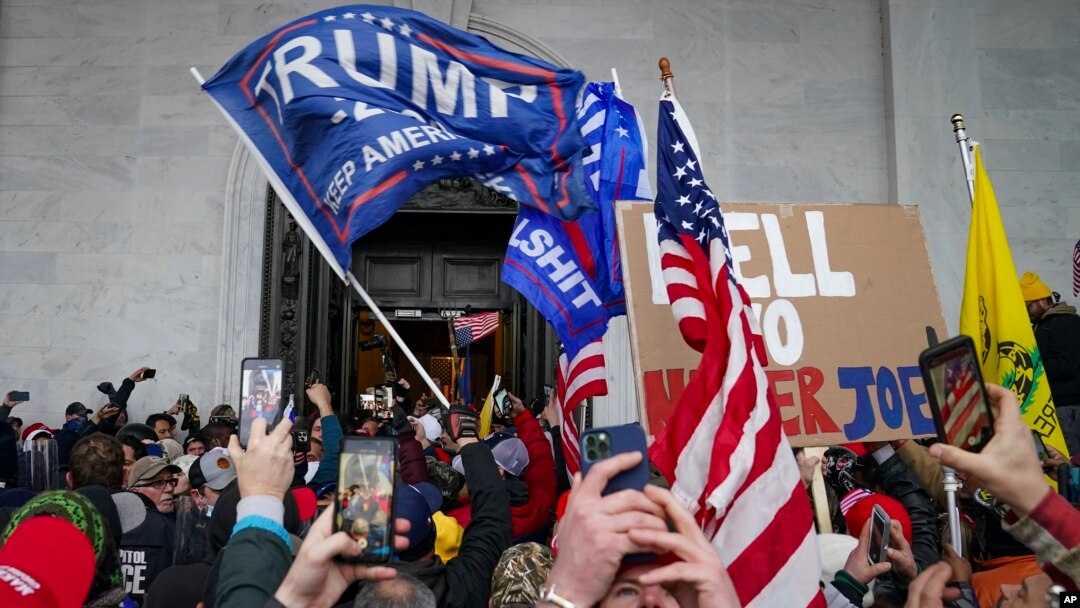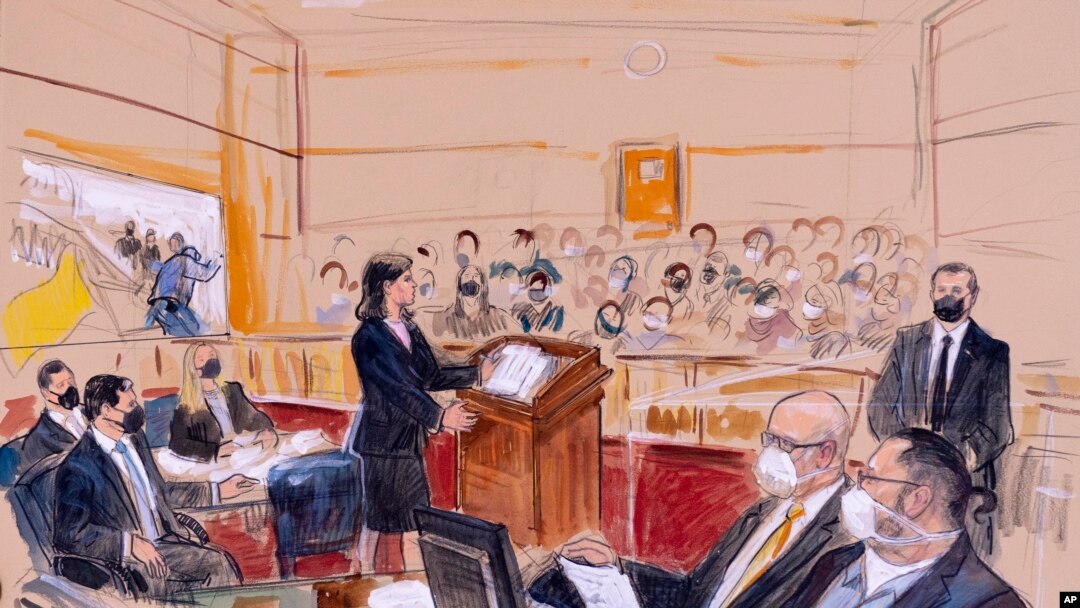A Texas man was convicted on Tuesday of storming the U.S. Capitol with a holstered handgun, a milestone victory for federal prosecutors in the first trial among hundreds of cases arising from last year’s riot.
A jury also convicted Guy Wesley Reffitt of interfering with police officers who were guarding the Capitol on January 6, 2021, and of obstructing justice for threatening his two teenage children if they reported him to law enforcement after the attack. Jurors deliberated for about three hours and convicted him on all counts.
The verdict could be a bellwether for many other Capitol riot cases. It could give Justice Department prosecutors more leverage in plea negotiations and discourage other defendants from gambling on trials of their own.
Reffitt, 49, of Wylie, Texas, didn’t testify at his trial, which started last Wednesday. He didn't visibly react to the verdict, but his face was covered by a mask.

FILE - Insurrections loyal to President Donald Trump riot outside the Capitol, Jan. 6, 2021, in Washington.
During the trial’s closing arguments on Monday, Assistant U.S. Attorney Risa Berkower told jurors that Reffitt drove to Washington intending to stop Congress from certifying President Joe Biden’s electoral victory. Reffitt proudly “lit the fire” that allowed others in a mob to overwhelm Capitol police officers near the Senate doors, the prosecutor said.
Reffitt was not accused of entering the Capitol building. Defense attorney William Welch said there is no evidence that Reffitt damaged property, used force or physically harmed anybody.
The defense lawyer urged jurors to acquit Reffitt of all charges but one: He said they should convict him of a misdemeanor charge that he entered and remained in a restricted area.
Reffitt faced a total of five counts: obstruction of an official proceeding, being unlawfully present on Capitol grounds while armed with a firearm, transporting firearms during a civil disorder, interfering with law enforcement officers during a civil disorder, and obstruction of justice.
Jurors saw videos that captured the confrontation between a few Capitol police officers and a mob of people, including Reffitt, who approached them on the west side of the Capitol.
Reffitt was armed with a Smith & Wesson pistol in a holster on his waist, carrying zip-tie handcuffs and wearing body armor and a helmet equipped with a video camera when he advanced on police, according to prosecutors. He retreated after an officer pepper sprayed him in the face, but he waved on other rioters who ultimately breached the building, prosecutors said.
Before the crowd advanced, Reffitt used a megaphone to shout at police to step aside and to urge the mob to push forward and overtake officers. Assistant U.S. Attorney Jeffrey Nestler said Reffitt played a leadership role that day.
During last Friday’s testimony, prosecutors enlarged a video image of Reffitt at the Capitol. FBI Special Agent Laird Hightower said the image shows “a silvery metallic linear object” in a holster protruding from under Reffitt’s jacket as he leaned forward.
Shauni Kerkhoff, who was one of the Capitol police officers who tried to repel Reffitt, said she launched pepper-balls that didn’t stop him from advancing. She testified that Reffitt appeared to be leading the crowd up the stairs toward police.
Reffitt’s 19-year-old son, Jackson, testified last Thursday that his father threatened him and his sister, then 16, after he drove home from Washington. Reffitt told his children they would be traitors if they reported him to authorities and said, “traitors get shot,” Jackson Reffitt recalled.
Jackson Reffitt, then 18, said the threat terrified him. His younger sister, Peyton, was listed as a possible government witness but didn’t testify.
Jackson Reffitt used a cellphone app to secretly record his father boasting about his role in the riot. Jurors heard excerpts of that family conversation.
Jackson Reffitt initially contacted the FBI on Christmas Eve, less than two weeks before the riot, to report concerns about his father’s behavior and increasingly worrisome rhetoric. But the FBI didn’t respond until January 6, after the riot erupted.
Another key witness, Rocky Hardie, said he and Reffitt were members of “Texas Three Percenters” militia group. The Three Percenters militia movement refers to the myth that only 3% of Americans fought in the Revolutionary War against the British.
Hardie drove from Texas to Washington with Reffitt. He testified that they were both armed with holstered handguns when they attended then-President Donald Trump’s “Stop the Steal” rally before the riot erupted. Reffitt also took an AR-15 rifle to Washington but left it locked up in his car, Hardie said.
Hardie said Reffitt, during their drive to Washington, talked about dragging lawmakers out of the Capitol and replacing them with people who would “follow the Constitution.” Hardie also said Reffitt gave him two pairs of zip-tie cuffs in case they needed to detain anybody.
Reffitt was arrested less than a week after the riot. FBI found a handgun in a holster on a nightstand in the defendant’s bedroom when they searched his home near Dallas.
More than 750 people have been charged with federal crimes related to the riot. More than 220 of them have pleaded guilty, mostly to misdemeanors, and more than 110 of them have been sentenced. About 90 others have trial dates.


